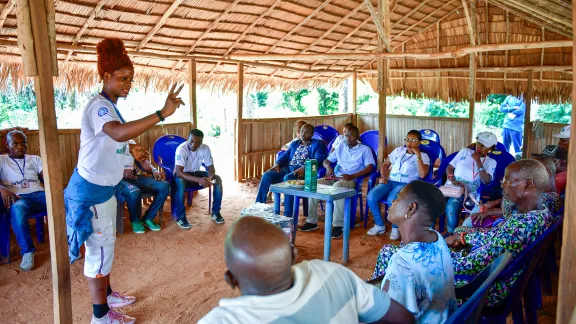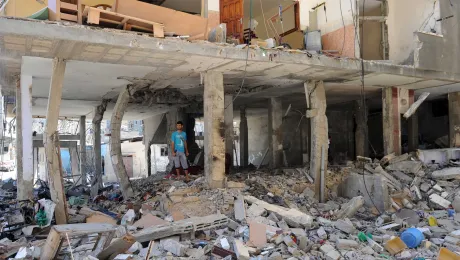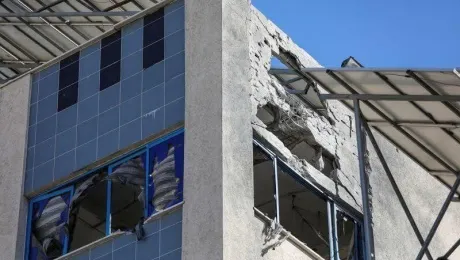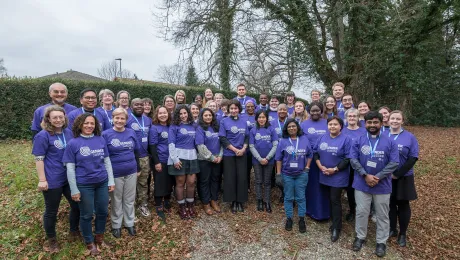
A returnee with the LWF’s Symbols of Hope program in Nigeria shares her story of surviving human trafficking. Photo: GNC/Thomas Lohnes
LWF and ecumenical partners hold webinar to mark World Day against Trafficking in Persons
(LWI) - ‘Leave no child behind’ is the theme for this year’s World Day against Trafficking in Persons, marked annually by the United Nations on 30 July. To highlight ways in which faith communities are working to tackle the global scourge of human trafficking in its many different forms, The Lutheran World Federation (LWF), the World Council of Churches (WCC) and other ecumenical partners organized a webinar to showcase some of their most effective responses.
“Trafficking involves the food we eat and the clothes we wear,” noted Rev. Nicole Ashwood, WCC’s program executive for a Just Community of Women and Men, “so how do we ensure that we see the signs?” Organizers, who also included the Salvation Army, United Women in Faith and the World Federation of Methodists, stressed the wide variety of ways in which children and adults can be trafficked, not just for forced labor or sexual exploitation, but also for forced marriages, child adoptions, organ transplants, begging and criminal activities such as benefit fraud or drug cultivation.
Ashwood also emphasized that over 180 nations have ratified a UN protocol to prevent trafficking in persons, which offers practical support to states in drafting laws and creating national anti-trafficking strategies. “As people of faith,” said Rev. Dionne Boissiere, chaplain of the UN Church Center in New York, “we gather to say it is time to end this scourge” of modern slavery.
Symbols of Hope supporting survivors and returnees
Rev. Emmanuel Gabriel, national director in Nigeria of the LWF’s Symbols of Hope program for returned migrants and trafficking survivors, spoke about the many ways in which this project is supporting and empowering such vulnerable people. Nigeria, he said, has the highest number of survivors in Africa and they are often subjected to stigmatization by their families and communities.
Over the past five years, Gabriel noted, more than 1,000 returnees have received different forms of support, including psychosocial, skills training and assistance in setting up small businesses to enable them to build new lives. Symbols of Hope works together with ecumenical partners and government agencies in the country to educate women and girls about the ways in which traffickers lure victims and families into this lucrative 150-billion-dollar business.
Two trafficking survivors who have been supported by Symbols of Hope in Nigeria shared personal testimonies of the ways in which they have been able to overcome their traumatic experiences. Sara Sande said she was trafficked by a family friend into prostitution and spent ten months in a Libyan jail before managing to return to her native country. Solomon Ugumba was offered work in Italy but the boat he was travelling on across the Mediterranean capsized, killing many on board. Today, both of them have started small businesses and receive psychosocial support.
Survivor-centered and trauma-informed
Another trafficking survivor, Malaika Oringo from Uganda, is the founder and director of Footprint to Freedom, an organization that gives voice and opportunities to others who have survived similar experiences. Oringo, who was supported by the Salvation Army and now works with the UN, underlined the links between child sexual abuse and human trafficking. Many cultures, she said, force children to keep silent about their abuse, but this protects the abusers, while increasing their vulnerability to traffickers. “A multi-layered approach is needed,” she said, to provide “safe spaces” for survivors’ voices to be heard.
Barrister R. Evon Idahosa was a partner at a U.S law firm before giving up that job to found Pathfinders Justice Initiative, an organization dedicated to supporting survivors of sexual violence and human trafficking. Originally from Edo State, which she said is "the hub of trafficking in Nigeria,” Idahosa insisted that all responses must be “survivor-centered and trauma-informed." She noted that Pathfinder has worked with 5,000 survivors and 25,000 secondary beneficiaries who include families and children.
Baptist minister Dr Angelita Clifton, president of Women in Service Everywhere, works to encourage and mobilize churches to prevent human trafficking, both in the U.S. and abroad. Much of her efforts have focused on educating churches about the ways in which children are exploited in sex tourism and other forms of servitude. She helps to organize prayer services and other events where survivors can speak up in a safe and family-friendly environment.
Education and awareness raising
Robina Malik from Pakistan, founder of an organization called Silent No More, spoke about the many different forms of human trafficking and modern slavery, as well as strategies that can help to identify and support those who have been trafficked. She said her organization works closely with churches and mosques to educate people and to help them create prevention strategies in their communities.
Rev. Dr Peter Spiro, a priest of the Greek Orthodox Archdiocese of America and chief chaplain for the Tennessee Bureau of Investigation, has recently been appointed as head of his church’s new National Ministry for Human Trafficking Awareness. He also heads a foundation that offers education and vocational support for survivors. He stressed the distinction between migrant smuggling and people trafficking, noting that education is key to helping church leaders and congregations understand the phenomenon.
A final speaker, Dr Charles Curtis, pastor of Mount Olive Baptist Church in Harlem, New York, explained that, as a child, he saw young boys being trafficked to the Middle East to work as camel jockeys. He has worked closely with the Assocation for the Recovery of Children and has appealed to President Biden to instigate a national day of prayer to make people more aware of this widespread problem. Like all the participants, he emphasized the vital role that churches and faith-based organizations can play in awareness raising and prevention of the scourge of human trafficking.


